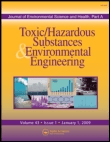
JOURNAL OF ENVIRONMENTAL SCIENCE AND HEALTH PART A-TOXIC/HAZARDOUS SUBSTANCES & ENVIRONMENTAL ENGINEERING
Scope & Guideline
Pioneering research for a safer, healthier environment.
Introduction
Aims and Scopes
- Environmental Toxicology and Risk Assessment:
Research that evaluates the toxic effects of pollutants and hazardous substances on human health and ecosystems, including studies on heavy metals, organic pollutants, and emerging contaminants. - Wastewater Treatment and Management:
Innovative methodologies for treating wastewater, including advanced oxidation processes, bioremediation techniques, and the use of nanomaterials to enhance removal efficiencies. - Pollution Monitoring and Control:
Studies that focus on the monitoring of pollutants in air, water, and soil, as well as the development of policies and technologies aimed at pollution control. - Sustainable Environmental Engineering:
Research that promotes sustainable practices in engineering to address environmental challenges, including the use of green technologies and eco-friendly materials. - Ecotoxicology and Environmental Health:
Investigations into the effects of environmental pollutants on living organisms, including assessments of bioaccumulation, biomagnification, and health risks associated with exposure.
Trending and Emerging
- Nanotechnology in Environmental Applications:
An increasing number of studies focus on the use of nanomaterials for pollution remediation, indicating a trend towards exploring the benefits and risks of nanotechnology in environmental health. - Machine Learning and Data Analytics:
The integration of machine learning approaches for predictive modeling and optimization in environmental studies is gaining traction, showcasing the journal's shift towards data-driven research. - Health Impacts of Environmental Pollutants:
There is a growing emphasis on the direct health implications of environmental contamination, particularly studies linking exposure to pollutants with specific health outcomes. - Microplastics and Emerging Contaminants:
Research on the environmental impact and health risks associated with microplastics and other newly recognized contaminants is on the rise, reflecting increasing public and scientific concern. - Sustainable Practices in Waste Management:
A trend towards exploring sustainable and circular economy practices in waste management, including the reuse and recycling of materials, is becoming more prominent in recent publications.
Declining or Waning
- Traditional Wastewater Treatment Methods:
There has been a noticeable decrease in publications focusing solely on conventional wastewater treatment techniques, as more emphasis is placed on innovative and advanced methods. - Chemical Remediation Techniques:
Research on classical chemical remediation methods is becoming less frequent, with a shift towards biological and integrated approaches that combine multiple technologies. - General Environmental Monitoring:
Studies that provide broad assessments of environmental quality without specific focus on health outcomes or innovative methodologies are declining in favor of more targeted, health-related research.
Similar Journals

Chemosphere
Bridging the gap between chemical research and global sustainability challenges.Chemosphere is a prestigious peer-reviewed journal published by PERGAMON-ELSEVIER SCIENCE LTD, focusing on a wide array of critical topics in the fields of Chemistry, Environmental Science, and Public Health. Since its inception in 1972, the journal has become a vital platform for disseminating groundbreaking research, consistently ranking in the Q1 quartile across multiple categories, including Environmental Chemistry, Health, Toxicology and Mutagenesis, and Pollution. Its esteemed position is underlined by its impressive Scopus rankings, with significant placement in leading subsectors such as Environmental Science and Medicine. Although Chemosphere currently does not offer Open Access options, it remains a valuable resource for researchers and professionals seeking to advance their understanding of chemical interactions and their environmental impacts. The journal serves as an essential asset for students and academics alike, parsing complex issues of pollution, health, and toxicology while fostering inter-disciplinary approaches to remedy global challenges in environmental sustainability.
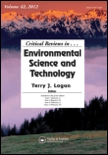
CRITICAL REVIEWS IN ENVIRONMENTAL SCIENCE AND TECHNOLOGY
Championing Rigorous Reviews in Environmental ScienceWelcome to CRITICAL REVIEWS IN ENVIRONMENTAL SCIENCE AND TECHNOLOGY, an esteemed journal published by Taylor & Francis Inc. This journal has been at the forefront of environmental research since its inception in 1993, spanning a wide range of disciplines including environmental engineering, pollution control, waste management, and water science. CRITICAL REVIEWS holds an impressive Q1 ranking in multiple categories, including Environmental Engineering and Pollution, demonstrating its critical role in advancing knowledge within the field. With a remarkable Scopus ranking—placing it in the top 1% for Environmental Science categories—this journal serves as an invaluable resource for researchers, professionals, and students alike, providing comprehensive reviews and analyses that catalyze innovative solutions to pressing environmental challenges. Though currently not open access, the journal's content is accessible through various academic platforms, ensuring that cutting-edge research is available to a global audience. Join the community of scholars dedicated to enhancing our understanding of environmental science and technology through rigorous investigation and critical discourse.
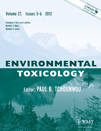
ENVIRONMENTAL TOXICOLOGY
Advancing the Science of Environmental SafetyENVIRONMENTAL TOXICOLOGY, published by Wiley, is a premier academic journal dedicated to the multifaceted study of toxic substances in the environment and their effects on human health and ecosystems. With the ISSN 1520-4081 and E-ISSN 1522-7278, this journal holds a prestigious position in the field, being ranked in the Q1 category across various relevant disciplines, including Health, Toxicology and Mutagenesis, and Management, Monitoring, Policy and Law. The journal regularly publishes high-quality research articles, reviews, and policy discussions aimed at understanding the implications of environmental toxins from 1980 to the present, contributing to the body of knowledge critical for the safety and sustainability of our environment. Researchers and professionals will find a treasure trove of information that not only highlights current trends and methodologies but also sets the stage for future advancements in toxicology. As a key resource, it provides valuable insights necessary for policy-making, environmental management, and public health, reinforcing its significance in the ever-evolving fields of toxicology and environmental science.

Pollution
Championing the fight against pollution through knowledge.Pollution is a distinguished open-access journal published by UNIV TEHRAN, dedicated to advancing the understanding of environmental science and the multifaceted aspects of pollution research. Since its establishment in 2015, the journal has been committed to disseminating high-quality, peer-reviewed articles that address the pressing issues of environmental degradation globally. With an impact factor and a Scopus rank that places it within the top tier of Environmental Science (Rank #141/233), Pollution serves as an essential resource for researchers, professionals, and students alike. The journal encompasses a wide range of topics, including the sources, effects, and mitigation strategies related to various forms of pollution, thereby aiming to contribute significantly to the scientific community's efforts in promoting environmental sustainability. Its innovative and timely approach positions Pollution as a vital platform for sharing knowledge and fostering interdisciplinary collaboration in the environmental science domain.

Frontiers in Toxicology
Navigating the Frontiers of Toxicological DiscoveryFrontiers in Toxicology, published by Frontiers Media SA, is a prominent open-access journal dedicated to advancing the understanding of toxicological science. Established in 2019, it serves as a vital forum for innovative research, offering insights into the pharmacological impacts and toxicological profiles of various substances. With its international reach based in Switzerland, this journal has quickly ascended in the academic community, achieving a notable Q1 ranking in Pharmacology, Toxicology and Pharmaceutics (Miscellaneous) and a Q2 ranking in Toxicology as of 2023. The journal is indexed in Scopus, where it ranks #8 out of 43 in its primary category, underscoring its influence and relevance in the field. The scope encompasses cutting-edge studies on the mechanisms of toxicity, including both human and environmental impacts, making it an essential resource for researchers, professionals, and students alike. By promoting open access to high-quality research, Frontiers in Toxicology plays a crucial role in enhancing knowledge sharing and fostering collaboration across disciplines.

JOURNAL OF APPLIED TOXICOLOGY
Connecting Researchers to the Future of ToxicologyJOURNAL OF APPLIED TOXICOLOGY, published by Wiley, stands as a leading platform in the field of toxicology, focusing on the rigorous examination of chemical substances and their effects on biological systems. With an impressive Impact Factor, it ranks in the top quartile (Q2) for toxicology journals, reflecting its esteemed position within the scientific community. The journal, identifiable by its ISSN 0260-437X and E-ISSN 1099-1263, has been an invaluable resource since its inception in 1981, and it continues to serve as a conduit for innovative research and practical applications through 2024. Positioned at the forefront of the field, it garners recognition in the Scopus Rankings, where it ranks #31 out of 133 journals in the toxicology category, placing it in the 77th percentile—a testament to its contribution to the advancement of pharmacology and toxicological sciences. While not an open-access journal, it remains accessible to a wide audience of researchers, professionals, and students eager to explore cutting-edge findings in applied toxicology, making it a pivotal resource for enhancing knowledge and fostering collaboration in the field.

Toxicological Research
Exploring the intricate relationship between substances and health.Toxicological Research is a prominent academic journal dedicated to advancing the field of toxicology through rigorous exploration and innovative research. Published by the Korean Society of Toxicology, this journal serves as a vital resource for researchers, professionals, and students engaged in environmental science, pharmacology, and toxicology. With an ISSN of 1976-8257 and an E-ISSN of 2234-2753, Toxicological Research highlights significant findings and discussions in the realm of health, toxicology, and mutagenesis. Although not an open-access journal, it maintains a solid reputation as evidenced by its Q3 ranking in both health-related toxicology and general toxicology categories for 2023. The journal covers a broad spectrum of topics from fundamental research to applied toxicology and provides a unique platform for the dissemination of knowledge in a field that is increasingly relevant in today’s society. With an anticipated convergence period from 2008 to 2024, Toxicological Research continues to contribute vital insights to understanding the implications of toxic substances on health and the environment.
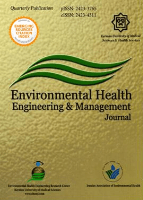
Environmental Health Engineering and Management Journal
Exploring Solutions for Healthier EnvironmentsEnvironmental Health Engineering and Management Journal is a premier platform dedicated to the dissemination of research findings in the essential field of environmental health. Published by Kerman University of Medical Sciences in Iran, this Open Access journal has been a beacon of scientific inquiry since its inception in 2014. With an ISSN of 2423-3765 and E-ISSN 2423-4311, it facilitates broad accessibility to cutting-edge research that addresses the complex interactions between environmental factors and human health. With a notable categorization in the Q3 quartile for Environmental Science and Public Health, alongside Q4 in Chemical Health and Safety, the journal underscores its commitment to quality and relevance. Currently ranked #132 out of 233 in Environmental Science within Scopus, it serves as a crucial resource for researchers and practitioners striving to tackle contemporary environmental challenges. The journal's scope includes innovative methodologies, environmental risk assessment, and sustainable health practices, positioning it as an indispensable reference for those invested in improving public health outcomes through environmental engineering and management.
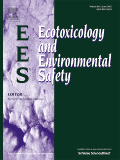
ECOTOXICOLOGY AND ENVIRONMENTAL SAFETY
Exploring the vital connections between pollutants and ecosystems.ECOTOXICOLOGY AND ENVIRONMENTAL SAFETY, published by Academic Press Inc. Elsevier Science, stands as a premier journal in the field of environmental science, specializing in the intricate relationships between toxic substances and ecological systems. With a commendable impact factor and recognized as a Q1 journal in various categories including Health, Toxicology and Mutagenesis, and Public Health, it consistently ranks among the top publications in Scopus, placing it in the 96th percentile for Medicine and Public Health. Established in 1977, this journal addresses critical issues related to environmental safety and pollution, making it an essential resource for researchers, professionals, and students alike. Although it does not offer an open access option, the journal’s commitment to publishing rigorous and impactful research makes it a vital platform for advancing the understanding of ecotoxicological risk assessments and environmental protection strategies. For those dedicated to the intersection of science and public health, ECOTOXICOLOGY AND ENVIRONMENTAL SAFETY serves as a beacon of knowledge and innovative research.
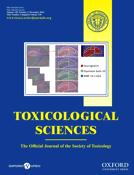
TOXICOLOGICAL SCIENCES
Empowering Research, Protecting HealthTOXICOLOGICAL SCIENCES, published by Oxford University Press, is a premier journal in the field of toxicology that has been a cornerstone of scientific discourse since its inception in 1981. With an impressive 2023 impact factor and ranked in the Q1 category for Toxicology, this journal is highly regarded among researchers, professionals, and students dedicated to pharmacology and toxicology. The journal is committed to advancing the understanding of toxicological science, covering a breadth of topics that include the mechanisms of toxicity, risk assessment, and the regulatory aspects affecting public health. With an ISSN of 1096-6080 and an E-ISSN of 1096-0929, TOXICOLOGICAL SCIENCES facilitates open access scholarly work, ensuring that critical research reaches a global audience and promotes collaborative learning. As it converges towards 2024, the journal remains pivotal in shaping the future of toxicology research, providing insights that are essential for developing safer chemicals and protecting environmental health.